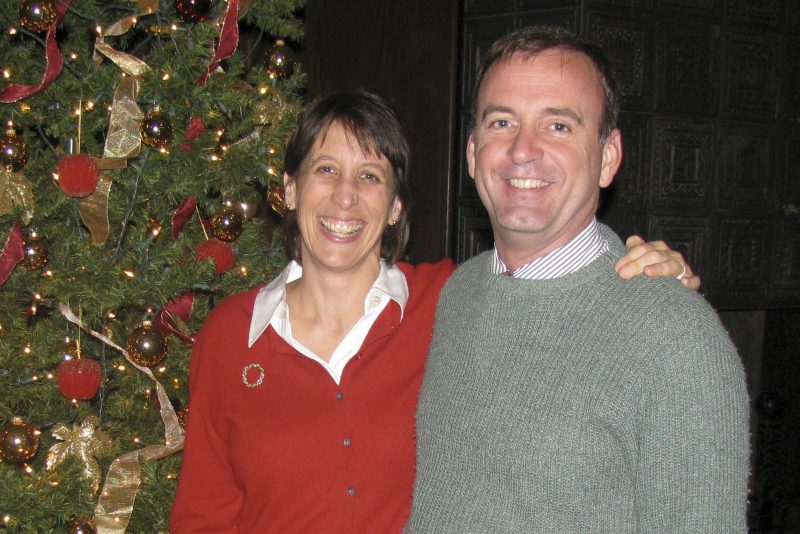This summer, the waters of Tacoma, Washington, situated on the banks of Puget Sound, will become a little bit richer with the arrival of Stephen Nickle and Catherine Morell-Nickle.
Stephen Nickle, Trinity chaplain, and Catherine Morell-Nickle, assistant director for Student Accessibility Services, have been faithful and passionate supporters of the Trinity community since Nickle was hired in 2000.
Nickle has served as Trinity’s chaplain for 18 years. After this semester, Nickle will begin a year-long pastoral residency at St. Joseph’s Medical Center in Tacoma, working with patients, families and staff.
Nickle discussed why he and Morell-Nickle made the decision to retire from Trinity this year.
“Some of it is my own sense that my work as a college chaplain — I’ve been doing this for 31 years — is drawing to a close,” Nickle said. “And then I’m excited for something around the corner. I’m kind of seeing out of my peripheral vision, don’t even have a real clear sense of what that next thing is. Although I’m sure [the new position at St. John’s] will build on and draw from the kinds of capacities that being chaplain here has nurtured in me.”
Since 2013, Morell-Nickle has worked at Trinity’s Student Success Center, which offers accommodations for students regarding academics, housing or meal plans. Before she joined the Trinity staff, Morell-Nickle received her M.A. in school psychology from Trinity and worked with students in the Northside Independent School District in San Antonio.
Nickle explained that he and Morell-Nickle made the decision to move to Washington together.
“We have a pretty egalitarian marriage — not one where I come and say, ‘We’re moving,’ ” Nickle said. “I guess I could, but she’d probably say, ‘Well, the commute’s going to be long for you.’ ”
Moving to Tacoma will be a big change for the Nickles, but they are excited for the newness and challenge it will bring. Though Nickle has planned his pastoral residency, Morell-Nickle has not yet decided what path she will take. She hopes to continue working with students.
“[I want to continue] some kind of work. I’m not really sure what shape that will take yet. My focus has been, up until this point, pretty immediate,” Morell-Nickle said.
Nickle and Morell-Nickle have thought about retiring since last semester but decided to wait to decide until after winter break. However, once they got back to campus, they decided retirement was the next move.
“I wanted to give the university some time to go through the process,” Nickle said. “I’ve been here 18 years. I hope I’ve disappointed people enough so that they’re thinking, ‘Okay, we’ve ought to think of some improvements,’ or ‘Here are some things that do work.’ ”
The university will be conducting a review of the chaplaincy to develop a more accurate description and to think about what kind of characteristics would best fit the position.
“It’s important to focus on the word ‘chaplaincy,’ not ‘chaplain.’ This is not a review of an individual,” President Danny Anderson wrote in an email interview. “It is an opportunity for an external, third party to listen to voices on our campus and report back to us what kinds of hopes we have for this role.”
The university plans to interview members of various faith organizations on campus. Anderson will appoint a search committee after speaking to the key constituents and to John Williams, university chaplain of Austin College, who will be conducting the review of the chaplaincy.
According to Sheryl Tynes, vice president of student affairs, Nickle played an important role in Trinity’s community, especially concerning one-on-one work with students.
“He’s a healer. When we’ve had any type of campus tragedy, he’s a healer, and that’s what he’s really good at,” Tynes said. “There are lots of times where he will partner with counseling services where he will facilitate something for a group or just make himself available and students will seek him out.”
Morell-Nickle also worked one-on-one with students to help them overcome challenges through SAS.
“Students come in with some kind of a label, and leave it there and we talk about what kind of barriers are created because of whatever that is. So when we start talking about those barriers, we create a plan to mitigate against those barriers,” Morell-Nickle said. “That, in essence, is what accessibility services is about.”
Nickle will look back on his and Morell-Nickle’s time at Trinity with fond memories of talking to students about their experiences and watching them grow.
“What I see in college students is there can be something cooking as people are moving through their senior year that’s very different than how they did life in their first year. It is a privilege to be able to accompany folks in that time of life,” Nickle said.
With additional reporting by Kathleen Creedon, news editor







